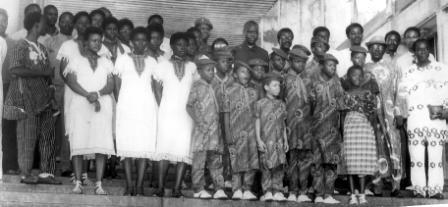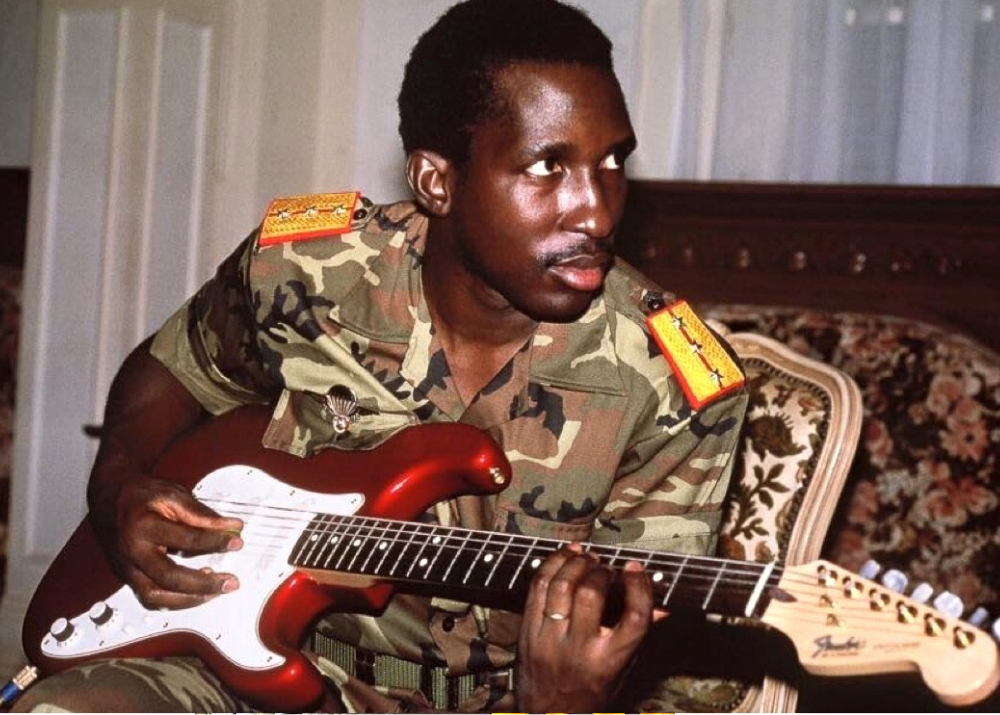“Music helps to balance the human being, and Sankara understood this so well that for him music was central to everything he did,” says Sams’k le Jah, reggae-man and founding member of Balai Citoyen. In 1987, Sams’k was only a young man, but since then he has never stopped cultivating the legacy of the man who was, according to him, “the invisible commander” of the insurrection that ousted Blaise Compaoré from power in 2014.
Music for a coup d’état
Thirty-one years earlier, on August 4, 1983, Sankara and his brothers-in-arms, including Captain Blaise Compaoré, seized power in Ouagadougou, quietly deposing the doctor Colonel Jean-Baptiste Ouédraogo. That same night, Sankara sent for his friend Abdoulaye Cissé, a musician and host at the national radio station. Still working in Ouagadougou, he remembers: “When you take over the radio, you first put on military music to make a clean break with the programs… But you can’t put on military music all the time, so you have to find something else. As I was working in radio, I knew well the songs that we have there. We put aside the songs that put people to sleep, the songs that say “I love you”, etc… to choose more committed songs.”
Among them, two songs by Abdoulaye Cissé himself, “Jeunesse Wilila” and “Les Vautours”, recorded in 1980 in Cotonou.
More than a hundred vultures soared through the night
Les Vautours, A. Cissé, 1980
And on the trees, around the village
They perched waiting for the morning
They surprised the whole town
And ravaged everything in their path
The vultures, explains Cissé, “are the colonists who came to monopolize the wealth of Africa under the pretext of civilizing us. They gave us back our freedom, but in their place, new colonists arrived… the moral is that true freedom is not the one that was handed to us with the left hand and taken away with the right. Real freedom, we snatch it away.“
In power, the president of Upper Volta renamed the country Burkina Faso (the country of men of integrity). In the Sankarist revolution, culture has an essential place. The captain revitalized FESPACO, the Pan-African Film Festival of Ouagadougou, and, under his direction, movie theatres multiplied and became more democratic, just like the theatres that sprang up in the provinces. To relay the revolutionary messages, Sankara asked Abdoulaye Cissé to form two orchestras: the first composed of children, inspired by the petits chanteurs à la croix de bois (Little Singers of the Wooden Cross), which he christened… The second, composed of young girls, was to be called Les Colombes de la Révolution. The success of the Amazons of Guinea and the cultural policy of Sékou Touré was emulated.

Abdoulaye Cissé, directly attached to the presidency, recruited other supervisors such as Maurice Simporé (from the Harmonie Voltaïque), and set about training all these young people who would accompany President Sankara on his trips abroad. They sang in Libya, Cameroon, Congo, Cuba etc. …. Their story is told in this documentary by Ciné-droit libre.
Tout à coup Jazz
Together with Abdulaye Cissé, the two orchestra leaders formed a group, Tout à coup Jazz, in which Thomas Sankara played guitar. “He was not a great musician,” explains Cissé, “but he was a great lover of music. But he wrote texts, and being an author is already a lot. He wrote to free himself: whether it was political ideas, romantic poems, it was to free himself… and when we played together, it was a way for him to decompress.” The members of Tout à coup would meet at the presidential palace to play, and Blaise Compaoré would sometimes find them taking the microphone to sing. They were all on stage again in 1984 for the last night of the Gaoua culture week (in the south of the country). The following year, this great national festival was held in Bobo-Dioulasso (the country’s second largest city, in the west of Burkina). Sankara wrote the lyrics of a song to promote and accompany the event. He called Cissé who was already in Bobo: “He told me: recruit musicians to record it. I called on ten musicians, and Sankara sent a military plane to get us to Ouagadougou as soon as possible. On the radio, we recorded with Ignace Sawadogo. At the end of the same day, the song was ready and the tape went to the studio for broadcast. The title was: “Sur la route de Bobo“.
His political legacy remains immense and there are countless artists in Burkina Faso and abroad who have paid tribute to him in music. In the same way that the government had launched the “commando vaccination” (vaccinating all the children in the country in record time), Sankara apparently practiced the commando song. “Sur la route de Bobo” is registered with the Burkinabe copyright office (author: T. Sankara, composer: A. Cissé).
“I have set two or three of his texts to music,” says Cissé, “and I still have some waiting.” And, of course, Thomas Sankara participated in the creation of the anthem, the Ditanye. His assassination in 1987 stopped all this momentum, and all the other projects that the President of Faso had for music in his country. His guitar still remains in the room he occupied as a young man visiting his parents. His political legacy remains immense and there are countless artists, both in Burkina and abroad, who have paid tribute to him in music.
